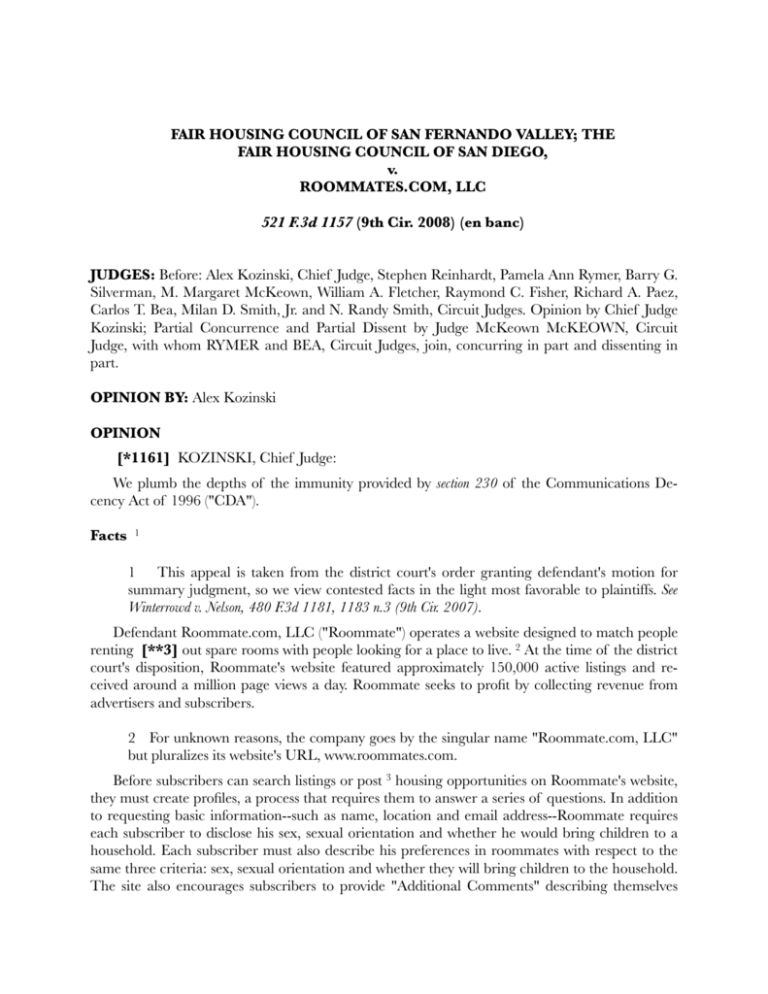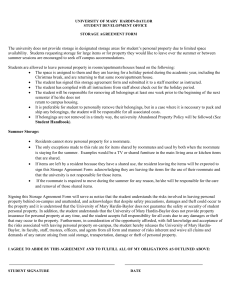Fair Housing Council v. Roommates
advertisement

FAIR HOUSING COUNCIL OF SAN FERNANDO VALLEY; THE FAIR HOUSING COUNCIL OF SAN DIEGO, v. ROOMMATES.COM, LLC 521 F.3d 1157 (9th Cir. 2008) (en banc) JUDGES: Before: Alex Kozinski, Chief Judge, Stephen Reinhardt, Pamela Ann Rymer, Barry G. Silverman, M. Margaret McKeown, William A. Fletcher, Raymond C. Fisher, Richard A. Paez, Carlos T. Bea, Milan D. Smith, Jr. and N. Randy Smith, Circuit Judges. Opinion by Chief Judge Kozinski; Partial Concurrence and Partial Dissent by Judge McKeown McKEOWN, Circuit Judge, with whom RYMER and BEA, Circuit Judges, join, concurring in part and dissenting in part. OPINION BY: Alex Kozinski OPINION [*1161] KOZINSKI, Chief Judge: We plumb the depths of the immunity provided by section 230 of the Communications Decency Act of 1996 ("CDA"). Facts 1 1 This appeal is taken from the district court's order granting defendant's motion for summary judgment, so we view contested facts in the light most favorable to plaintiffs. See Winterrowd v. Nelson, 480 F.3d 1181, 1183 n.3 (9th Cir. 2007). Defendant Roommate.com, LLC ("Roommate") operates a website designed to match people renting [**3] out spare rooms with people looking for a place to live. 2 At the time of the district court's disposition, Roommate's website featured approximately 150,000 active listings and received around a million page views a day. Roommate seeks to profit by collecting revenue from advertisers and subscribers. 2 For unknown reasons, the company goes by the singular name "Roommate.com, LLC" but pluralizes its website's URL, www.roommates.com. Before subscribers can search listings or post 3 housing opportunities on Roommate's website, they must create profiles, a process that requires them to answer a series of questions. In addition to requesting basic information--such as name, location and email address--Roommate requires each subscriber to disclose his sex, sexual orientation and whether he would bring children to a household. Each subscriber must also describe his preferences in roommates with respect to the same three criteria: sex, sexual orientation and whether they will bring children to the household. The site also encourages subscribers to provide "Additional Comments" describing themselves and their desired roommate in an open-ended essay. After a new subscriber completes the application, Roommate assembles his answers into a "profile page." The profile page displays the subscriber's pseudonym, his description and his preferences, as divulged through answers to Roommate's questions. 3 In the online context, "posting" refers to providing material that can be viewed by other users, much as one "posts" notices on a physical bulletin board. Subscribers can choose between two levels of service: Those using the site's free service level can create their own personal profile page, search the profiles of others and send personal email messages. They can also receive periodic emails from Roommate, informing them of available housing opportunities matching their preferences. Subscribers who pay a monthly fee also gain the ability to read emails from other users, and to view other subscribers' "Additional Comments." The Fair Housing Councils of the San Fernando Valley and San Diego ("Councils") sued Roommate in federal court, alleging that Roommate's business violates the federal Fair Housing Act ("FHA"), 42 U.S.C. § 3601 et seq., and California housing discrimination laws. 4 Councils claim that Roommate is effectively a housing broker doing online what it may not lawfully do offline. The district court held that Roommate is immune under section 230 of the CDA, 47 U.S.C. § 230(c), and dismissed the federal claims without considering whether Roommate's actions violated the FHA. The court then declined to exercise supplemental jurisdiction over the state law claims. Councils appeal the dismissal of the FHA claim and Roommate cross-appeals the denial of attorneys' fees. 4 The Fair Housing Act prohibits certain forms of discrimination on the basis of "race, color, religion, sex, familial status, or national origin." 42 U.S.C. § 3604(c). The California fair housing law prohibits discrimination on the basis of "sexual orientation, marital status, . . . ancestry, . . . source of income, or disability," in addition to reiterating the federally protected classifications. Cal. Gov. Code § 12955. Analysis Section 230 of the CDA immunizes providers of interactive computer services 6 against liability arising from content created by third parties: "No provider . . . of an interactive computer service shall be treated as the publisher or speaker of any information provided by another information content provider." 47 U.S.C. § 230(c). 7 This grant of immunity applies only if the interactive computer service provider is not also an "information content provider," which is defined as someone who is "responsible, in whole or in part, for the creation or development of" the offending content. Id. § 230(f)(3). 6 Section 230 defines an "interactive computer service" as "any information service, system, or access software provider that provides or enables computer access by multiple users to a computer server." 47 U.S.C. § 230(f)(2); see Carafano v. Metrosplash.com, Inc., 207 F. Supp. 2d 1055, 1065-66 (C.D. Cal. 2002) (an online dating website is an "interactive computer service" under the CDA), aff'd, 339 F.3d 1119 (9th Cir. 2003). Today, the most common interac- tive computer services are websites. Councils do not dispute that Roommate's website is an interactive computer service. 7 The Act also gives immunity to users of third-party content. This case does not involve any claims against users so we omit all references to user immunity when quoting and analyzing the statutory text. A website operator can be both a service provider and a content provider: If it passively displays content that is created entirely by third parties, then it is only a service provider with respect to that content. But as to content that it creates itself, or is "responsible, in whole or in part" for creating or developing, the website is also a content provider. Thus, a website may be immune from liability for some of the content it displays to the public but be subject to liability for other content. . . . [The court reviews pre-CDA caselaw.] In passing section 230, Congress sought to spare interactive computer services this grim choice by allowing them to perform some editing on user-generated content without thereby becoming liable for all defamatory or otherwise unlawful messages that they didn't edit or delete. In other words, Congress sought to immunize the removal of user-generated content, not the creation of content: "[S]ection [230] provides 'Good Samaritan' protections from civil liability for providers . . . of an interactive computer service for actions to restrict . . . access to objectionable online material. One of the specific purposes of this section is to overrule Stratton-Oakmont [sic] v. Prodigy and any other similar decisions which have treated such providers . . . as publishers or speakers of content that is not their own because they have restricted access to objectionable material." H.R. Rep. No. 104-458 (1996) (Conf. Rep.), as reprinted in 1996 U.S.C.C.A.N. 10 (emphasis added). Indeed, the section is titled "Protection for 'good samaritan' blocking and screening of offensive material" and, as the Seventh Circuit recently held, the substance of section 230(c) can and should be interpreted consistent with its caption. Chi. Lawyers' Comm. for Civ. Rights Under Law, Inc. v. Craigslist, Inc., No. 07- 1101, 519 F.3d 666, 2008 U.S. App. LEXIS 5472, slip op. at 6 (7th Cir. Mar. 14, 2008) (quoting Doe v. GTE Corp., 347 F.3d 655, 659-60 (7th Cir. 2003)). With this backdrop in mind, we examine three specific functions performed by Roommate that are alleged to violate the Fair Housing Act and California law. 1. Councils first argue that the questions Roommate poses to prospective subscribers during the registration process violate the Fair Housing Act and the analogous California law. Councils allege that requiring subscribers to disclose their sex, family status and sexual orientation "indicates" an intent to discriminate against them, and thus runs afoul of both the FHA and state law. 13 13 The Fair Housing Act prohibits any "statement . . . with respect to the sale or rental of a dwelling that indicates . . . an intention to make [a] preference, limitation, or discrimination" on the basis of a protected category. 42 U.S.C. § 3604(c) (emphasis added). California law prohibits "any written or oral inquiry concerning the" protected status of a housing seeker. Cal. Gov. Code § 12955(b). Roommate created the questions and choice of answers, and designed its website registration process around them. Therefore, Roommate is undoubtedly the "information content provider" as to the questions and can claim no immunity for posting them on its website, or for forcing subscribers to answer them as a condition of using its services. Here we must determine whether Roommate has immunity under the CDA because Councils have at least a plausible claim that Roommate violated state and federal law by merely posing the questions. We need not decide whether any of Roommate's questions actually violate the Fair Housing Act or California law, or whether they are protected by the First Amendment or other constitutional guarantees, see craigslist, 2008 U.S. App. LEXIS 5472, *11; we leave those issues for the district court on remand. Rather, we examine the scope of plaintiffs' substantive claims only insofar as necessary to determine whether section 230 immunity applies. However, we note that asking questions certainly can violate the Fair Housing Act and analogous laws in the physical world. For example, a real estate broker may not inquire as to the race of a prospective buyer, and an employer may not inquire as to the religion of a prospective employee. If such questions are unlawful when posed face-to-face or by telephone, they don't magically become lawful when asked electronically online. The Communications Decency Act was not meant to create a lawless no-man'sland on the Internet. Councils also claim that requiring subscribers to answer the questions as a condition of using Roommate's services unlawfully "cause[s]" subscribers to make a "statement . . . with respect to the sale or rental of a dwelling that indicates [a] preference, limitation, or discrimination," in violation of 42 U.S.C. § 3604(c). The CDA does not grant immunity for inducing third parties to express illegal preferences. Roommate's own acts--posting the questionnaire and requiring answers to it--are entirely its doing and thus section 230 of the CDA does not apply to them. Roommate is entitled to no immunity. 2. Councils also charge that Roommate's development and display of subscribers' discriminatory preferences is unlawful. Roommate publishes a "profile page" for each subscriber on its website. The page describes the client's personal information--such as his sex, sexual orientation and whether he has children--as well as the attributes of the housing situation he seeks. The content of these pages is drawn directly from the registration process: For example, Roommate requires subscribers to specify, using a drop-down menu 17 provided by Roommate, whether they are "Male" or "Female" and then displays that information on the profile page. Roommate also requires subscribers who are listing available housing to disclose whether there are currently "Straight male(s)," "Gay male(s)," "Straight female(s)" or "Lesbian(s)" living in the dwelling. Subscribers who are seeking housing must make a selection from a drop-down menu, again provided by Roommate, to indicate whether they are willing to live with "Straight or gay" males, only with "Straight" males, only with "Gay" males or with "No males." Similarly, Roommate requires subscribers listing housing to disclose whether there are "Children present" or "Children not present" and requires housing seekers to say "I will live with children" or "I will not live with children." Roommate then displays these answers, along with other information, on the subscriber's profile page. This information is obviously included to help subscribers decide which housing opportunities to pursue and which to bypass. In addition, Roommate itself uses this information to channel subscribers away from listings where the individual offering housing has expressed preferences that aren't compatible [**16] with the subscriber's answers. 17 A drop-down menu allows a subscriber to select answers only from among options provided by the website. The dissent tilts at windmills when it shows, quite convincingly, that Roommate's subscribers are information content providers who create the profiles by picking among options and providing their own answers. Dissent at 3485-88. There is no disagreement on this point. But, the fact that users are information content providers does not preclude Roommate from also being an information content provider by helping "develop" at least "in part" the information in the profiles. As we explained in Batzel, the party responsible for putting information online may be subject to liability, even if the information originated with a user. See Batzel v. Smith, 333 F.3d 1018, 1033 (9th Cir. 2003). Here, the part of the profile that is alleged to offend the Fair Housing Act and state housing discrimination laws--the information about sex, family status and sexual orientation--is provided by subscribers in response to Roommate's questions, which they cannot refuse to answer if they want to use defendant's services. By requiring subscribers to provide the information as a condition of accessing its service, and by providing a limited set of pre-populated answers, Roommate becomes much more than a passive transmitter of information provided by others; it becomes the developer, at least in part, of that information. And section 230 provides immunity only if the interactive computer service does not "creat[e] or develop[ ]" the information "in whole or in part." See 47 U.S.C. § 230(f)(3). Our dissenting colleague takes a much narrower view of what it means to "develop" information online, and concludes that Roommate does not develop the information because "[a]ll Roommate does is to provide a form with options for standardized answers." Dissent at 3487. But Roommate does much more than provide options. To begin with, it asks discriminatory questions that even the dissent grudgingly admits are not entitled to CDA immunity. Dissent at 3480 n.5. The FHA makes it unlawful to ask certain discriminatory questions for a very good reason: Unlawful questions solicit (a.k.a. "develop") unlawful answers. Not only does Roommate ask these questions, Roommate makes answering the discriminatory questions a condition of doing business. This is no different from a real estate broker in real life saying, "Tell me whether you're Jewish or you can find yourself another broker." When a business enterprise extracts such information from potential customers as a condition of accepting them as clients, it is no stretch to say that the enterprise is responsible, at least in part, for developing that information. For the dissent to claim that the information in such circumstances is "created solely by" the customer, and that the business has not helped in the least to develop it, Dissent at 3487-88, strains both credulity and English. Roommate also argues that it is not responsible for the information on the profile page because it is each subscriber's action that leads to publication of his particular profile--in other words, the user pushes the last button or takes the last act before publication. We are not convinced that this is even true, but don't see why it matters anyway. The projectionist in the theater may push the last button before a film is displayed on the screen, but surely this doesn't make him the sole producer of the movie. By any reasonable use of the English language, Roommate is "responsible" at least "in part" for each subscriber's profile page, because every such page is a collaborative effort between Roommate and the subscriber. Similarly, Roommate is not entitled to CDA immunity for the operation of its search system, which filters listings, or of its email notification system, which directs emails to subscribers according to discriminatory criteria. 21 Roommate designed its search system so it would steer users based on the preferences and personal characteristics that Roommate itself forces subscribers to disclose. If Roommate has no immunity for asking the discriminatory questions, as we concluded above, see pp. 3455-57 supra, it can certainly have no immunity for using the answers to the unlawful questions to limit who has access to housing. 21 Other circuits have held that it is unlawful for housing intermediaries to "screen" prospective housing applicants on the basis of race, even if the preferences arise with landlords. See Jeanty v. McKey & Poague, Inc., 496 F.2d 1119, 1120-21 (7th Cir. 1974). For example, a subscriber who self-identifies as a "Gay male" will not receive email notifications of new housing opportunities supplied by owners who limit the universe of acceptable tenants to "Straight male(s)," "Straight female(s)" and "Lesbian(s)." Similarly, subscribers with children will not be notified of new listings where the owner specifies "no children." Councils charge that limiting the information a subscriber can access based on that subscriber's protected status violates the Fair Housing Act and state housing discrimination laws. It is, Councils allege, no different from a real estate broker saying to a client: "Sorry, sir, but I can't show you any listings on this block because you are [gay/female/black/a parent]." If such screening is prohibited when practiced in person or by telephone, we see no reason why Congress would have wanted to make it lawful to profit from it online. Roommate's search function is similarly designed to steer users based on discriminatory criteria. Roommate's search engine thus differs materially from generic search engines such as Google, Yahoo! and MSN Live Search, in that Roommate designed its system to use allegedly unlawful criteria so as to limit the results of each search, and to force users to participate in its discriminatory process. In other words, Councils allege that Roommate's search is designed to make it more difficult or impossible for individuals with certain protected characteristics to find housing-something the law prohibits. By contrast, ordinary search engines do not use unlawful criteria to limit the scope of searches conducted on them, nor are they designed to achieve illegal ends--as Roommate's search function is alleged to do here. Therefore, such search engines play no part in the "development" of any unlawful searches. See 47 U.S.C. § 230(f)(3). It's true that the broadest sense of the term "develop" could include the functions of an ordinary search engine--indeed, just about any function performed by a website. But to read the term so broadly would defeat the purposes of section 230 by swallowing up every bit of the immunity that the section otherwise provides. At the same time, reading the exception for co-developers as applying only to content that originates entirely with the website--as the dissent would seem to suggest--ignores the words "development . . . in part" in the statutory passage "creation or development in whole or in part." 47 U.S.C. § 230(f)(3) (emphasis added). We believe that both the immunity for passive conduits and the exception for co-developers must be given their proper scope and, to that end, we interpret the term "development" as referring not merely to augmenting the content generally, but to materially contributing to its alleged unlawfulness. In other words, a website helps to develop unlawful content, and thus falls within the exception to section 230, if it contributes materially to the alleged illegality of the conduct. . . . In an abundance of caution, and to avoid the kind of misunderstanding the dissent seems to encourage, we offer a few examples to elucidate what does and does not amount to "development" under section 230 of the Communications Decency Act: If an individual uses an ordinary search engine to query for a "white roommate," the search engine has not contributed to any alleged unlawfulness in the individual's conduct; providing neutral tools to carry out what may be unlawful or illicit searches does not amount to "development" for purposes of the immunity exception. A dating website that requires users to enter their sex, race, religion and marital status through drop-down menus, and that provides means for users to search along the same lines, retains its CDA immunity insofar as it does not contribute to any alleged illegality; this immunity is retained even if the website is sued for libel based on these characteristics because the website would not have contributed materially to any alleged defamation. Similarly, a housing website that allows users to specify whether they will or will not receive emails by means of user-defined criteria might help some users exclude email from other users of a particular race or sex. However, that website would be immune, so long as it does not require the use of discriminatory criteria. A website operator who edits user-created content--such as by correcting spelling, removing obscenity or trimming for length--retains his immunity for any illegality in the user-created content, provided that the edits are unrelated to the illegality. However, a website operator who edits in a manner that contributes to the alleged illegality--such as by removing the word "not" from a user's message reading "[Name] did not steal the artwork" in order to transform an innocent message into a libelous one--is directly involved in the alleged illegality and thus not immune. Here, Roommate's connection to the discriminatory filtering process is direct and palpable: Roommate designed its search and email systems to limit the listings available to subscribers based on sex, sexual orientation and presence of children. Roommate selected the criteria used to hide listings, and Councils allege that the act of hiding certain listings is itself unlawful under the Fair Housing Act, which prohibits brokers from steering clients in accordance with discriminatory preferences. We need not decide the merits of Councils' claim to hold that Roommate is sufficiently involved with the design and operation of the search and email systems--which are engineered to limit access to housing on the basis of the protected characteristics elicited by the registration process--so as to forfeit any immunity to which it was otherwise entitled under section 230. . .. 3. Councils finally argue that Roommate should be held liable for the discriminatory statements displayed in the "Additional Comments" section of profile pages. At the end of the registration process, on a separate page from the other registration steps, Roommate prompts subscribers to "tak[e] a moment to personalize your profile by writing a paragraph or two describing yourself and what you are looking for in a roommate." The subscriber is presented with a blank text box, in which he can type as much or as little about himself as he wishes. Such essays are visible only to paying subscribers. Subscribers provide a variety of provocative, and often very revealing, answers. The contents range from subscribers who "[p]ref[er] white Male roommates" or require that "[t]he person applying for the room MUST be a BLACK GAY MALE" to those who are "NOT looking for black muslims." Some common themes are a desire to live without "drugs, kids or animals" or "smokers, kids or druggies," while a few subscribers express more particular preferences, such as preferring to live in a home free of "psychos or anyone on mental medication." Some subscribers are just looking for someone who will get along with their significant other 34 or with their most significant Other. 35 34 "The female we are looking for hopefully wont [sic] mind having a little sexual incounter [sic] with my boyfriend and I [very sic]." 35 "We are 3 Christian females who Love our Lord Jesus Christ . . . . We have weekly bible studies and bi-weekly times of fellowship." Roommate publishes these comments as written. 36 It does not provide any specific guidance as to what the essay should contain, nor does it urge subscribers to input discriminatory preferences. Roommate is not responsible, in whole or in part, for the development of this content, which comes entirely from subscribers and is passively displayed by Roommate. Without reviewing every essay, Roommate would have no way to distinguish unlawful discriminatory preferences from perfectly legitimate statements. Nor can there be any doubt that this information was tendered to Roommate for publication online. See pp. 3466-67 supra. This is precisely the kind of situation for which section 230 was designed to provide immunity. See pp. 3453-3455 supra. 36 It is unclear whether Roommate performs any filtering for obscenity or "spam," but even if it were to perform this kind of minor editing and selection, the outcome would not change. See Batzel, 333 F.3d at 1031. The fact that Roommate encourages subscribers to provide something in response to the prompt is not enough to make it a "develop[er]" of the information under the common-sense interpretation of the term we adopt today. It is entirely consistent with Roommate's business model to have subscribers disclose as much about themselves and their preferences as they are willing to provide. But Roommate does not tell subscribers what kind of information they should or must include as "Additional Comments," and certainly does not encourage or enhance any discriminatory content created by users. Its simple, generic prompt does not make it a developer of the information posted. 37 37 Nor would Roommate be the developer of discriminatory content if it provided a freetext search that enabled users to find keywords in the "Additional Comments" of others, even if users utilized it to search for discriminatory keywords. Providing neutral tools for navigating websites is fully protected by CDA immunity, absent substantial affirmative conduct on the part of the website creator promoting the use of such tools for unlawful purposes. Councils argue that--given the context of the discriminatory questions presented earlier in the registration process--the "Additional Comments" prompt impliedly suggests that subscribers should make statements expressing a desire to discriminate on the basis of protected classifications; in other words, Councils allege that, by encouraging some discriminatory preferences, Roommate encourages other discriminatory preferences when it gives subscribers a chance to describe themselves. But the encouragement that bleeds over from one part of the registration process to another is extremely weak, if it exists at all. Such weak encouragement cannot strip a website of its section 230 immunity, lest that immunity be rendered meaningless as a practical matter. 38 38 It's true that, under a pedantic interpretation of the term "develop," any action by the website--including the mere act of making a text box available to write in--could be seen as "develop[ing]" content. However, we have already rejected such a broad reading of the term "develop" because it would defeat the purpose of section 230. See pp. 3461-64 supra. We must keep firmly in mind that this is an immunity statute we are expounding, a provision enacted to protect websites against the evil of liability for failure to remove offensive content. See pp. 3453-3455 supra. Websites are complicated enterprises, and there will always be close cases where a clever lawyer could argue that something the website operator did encouraged the illegality. Such close cases, we believe, must be resolved in favor of immunity, lest we cut the heart out of section 230 by forcing websites to face death by ten thousand duck-bites, fighting off claims that they promoted or encouraged--or at least tacitly assented to--the illegality of third parties. Where it is very clear that the website directly participates in developing the alleged illegality--as it is clear here with respect to Roommate's questions, answers and the resulting profile pages-immunity will be lost. But in cases of enhancement by implication or development by inference-such as with respect to the "Additional Comments" here--section 230 must be interpreted to protect websites not merely from ultimate liability, but from having to fight costly and protracted legal battles. The dissent prophesies doom and gloom for countless Internet services, Dissent at 3490-91, but fails to recognize that we hold part of Roommate's service entirely immune from liability. The search engines the dissent worries about, id., closely resemble the "Additional Comments" section of Roommate's website. Both involve a generic text prompt with no direct encouragement to perform illegal searches or to publish illegal content. We hold Roommate immune and there is no reason to believe that future courts will have any difficulty applying this principle. The message to website operators is clear: If you don't encourage illegal content, or design your website to require users to input illegal content, you will be immune. We believe that this distinction is consistent with the intent of Congress to preserve the freeflowing nature of Internet speech and commerce without unduly prejudicing the enforcement of other important state and federal laws. When Congress passed section 230 it didn't intend to prevent the enforcement of all laws online; rather, it sought to encourage interactive computer services that provide users neutral tools to post content online to police that content without fear that through their "good samaritan . . . screening of offensive material," 47 U.S.C. § 230(c), they would become liable for every single message posted by third parties on their website. *** In light of our determination that the CDA does not provide immunity to Roommate for all of the content of its website and email newsletters, we remand for the district court to determine in the first instance whether the alleged actions for which Roommate is not immune violate the Fair Housing Act, 42 U.S.C. § 3604(c). We vacate the dismissal of the state law claims so that the district court may reconsider whether to exercise its supplemental jurisdiction in light of our ruling on the federal claims. Fredenburg v. Contra Costa County Dep't of Health Servs., 172 F.3d 1176, 1183 (9th Cir. 1999). We deny Roommate's cross-appeal of the denial of attorneys' fees and costs; Councils prevail on some of their arguments before us so their case is perforce not frivolous.




